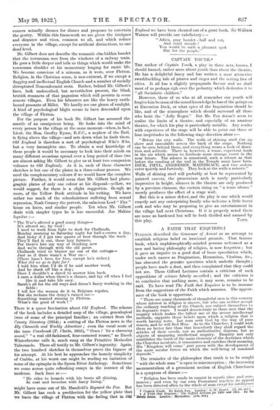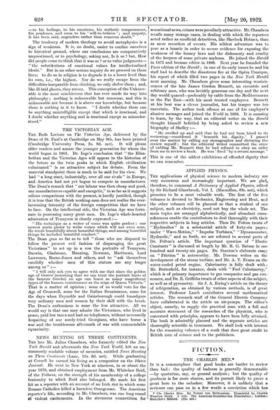A FAITH THAT ENQLTIRES.t
Trazocu described the Grammar of Assent as an attempt to establish religious belief on irrational grounds. That famous book, which unphilosophically-minded persons welcomed as a new and lasting philosophy of religion, is now forgotten ; but it gave an impulse to a good deal of loose speculation which, under such names as Pragmatism, Humanism, Vitalism, &c., has obscured the genuine questions which underlie thought ; people have made a dust, and then complained that they could not see. These Gifford Lectures contain a criticism of such oppositions of science falsely so-called ; and the criticism is so conclusive that nothing more, it may seem, remains to be said. To have read The Faith that Enquires is to be immune from the suggestions of the Faith which assumes. The appear-
ance of the book is opportune.
" There are many thousands of thoughtful men in this country whose interest in religion is sincere, but who can neither accept the ordinary teaching of the Church, nor subject themselves to its dogmatic ways. I would demonstrate to these men that the enquiry which makes the fullest use of the severe intellectual methods, supports those beliefs upon which a religion that is worth having rests. Let man seek God by the way of pure reason, and he will find Him. As to the Churches, I could wish them no better fate than that henceforth they shall regard the articles of their creeds, not as authoritative dogmas, but as objects of unsparing intellectual enquiry. Enquiry, not only establishes the truth of the main elements of the doctrines which the Churches inculcate, it transmutes and enriches their meaning. His ' Kingdom will come ' pari pawn with the development of the more secular forces on which the well-being of mankind depends."
The reminder of the philosopher that truth is to be sought " with the whole man " is open to misconception ; the increasing
sacramentalism of a prominent section of English Churchmen is a symptom of disease :— "Religion has been made to consist in mystic rites and cere- monies ; and even by our own Protestant teachers its appeal has been directed often to the whole of man except his intelligence • Captain Youth. By Ralph Fox. London : C. W. Daniel. (28. ad. net.] t A Faith that Enquires : The Gifford Lectures for 1920 and 1921. BY air Henry dome. London Macmillan. (18a. net.]
—to his feelings, to his emotions, his aesthetic temperament, his prudence, and even to his ' will-to-believe ' ; and enquiry, it has been said, engenders rather than removes doubt."
The tendency of modern theology to avoid metaphysics is a sign of weakness. it is, no doubt, easier to confine ourselves to historical ground, where our conclusions are comparatively unquestioned, or to psychology, asking not, Is it so ? but, How did people come to think that it was so ? or to value judgments- " the substitutions of emotional values for intellectualized ideals." But in no other serious inquiry do we proceed on these lines; to do so in religion is to degrade it to a lower level than its own, i.e., the highest. Nor do we really escape from the difficulties inseparable from thinking, we only shelve them ; and, like ill-laid ghosts, they return. This conception of the Unknow- able is the most mischievous that has ever made its way into philosophy ; nothing is unknowable but nonsense, and this is unknowable not because it is above our knowledge, but because there is nothing in it to know. " I doubt whether there can be anything unintelligible except that which is irrational, and I doubt whether anything real is irrational except as misunder- stood."



































 Previous page
Previous page